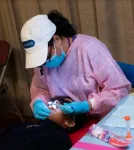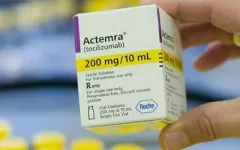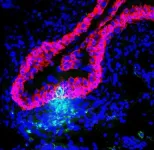School-based dental program reduces cavities by more than 50%
Study of nearly 7,000 elementary school students demonstrates success of school-based model and its potential to reduce health disparities and save federal dollars
2021-03-01
(Press-News.org) A school-based cavity prevention program involving nearly 7,000 elementary school students reduced cavities by more than 50 percent, according to a study led by researchers at NYU College of Dentistry. The findings are END
ELSE PRESS RELEASES FROM THIS DATE:
The enemy within: Understanding the mechanisms of r-chop resistance in b-cell lymphoma
2021-03-01
White blood cells or lymphocytes are the soldiers of our immune system that patrol the body via the lymphatic system. While their primary role is to protect the body by scavenging invaders, they can sometimes go rogue and become the enemy. Lymphoma, a type of blood cancer, results from the uncontrolled proliferation of lymphocytes. They are classified as Hodgkins and Non-Hodgkins lymphomas on the basis of the cell of origin and clinical characteristics. Of them, diffuse large B-cell lymphoma (DLBCL) is the most common Non-Hodgkins lymphoma and is highly aggressive and fast-growing.
A combination of rituximab plus cyclophosphamide, doxorubicin, vincristine, and prednisone (R-CHOP) is the standard treatment regimen for ...
Future of immunotherapy could be 'off-the-shelf' treatments
2021-03-01
In a new commentary for the journal Science, an associate vice president for research at The University of Texas at Arlington argues that emerging protein-based immunotherapies could lead to highly effective "off-the-shelf" cancer treatments for more patients.
Jon Weidanz, who also is a professor in the College of Nursing and Health Innovation at UTA, is the author of a perspective regarding the development of cancer immunotherapies.
His article, "Targeting cancer with bispecific antibodies," will appear in the March 5 edition of Science. It evaluates the findings of three studies by researchers at Johns Hopkins University and proposes that an emerging ...
Repurposed arthritis drug did not significantly improve severe COVID-19 pneumonia
2021-03-01
In a study published online February 25, 2021 in The New England Journal of Medicine, a repurposed drug used to treat arthritis did not significantly improve the outcomes of patients with severe COVID-19 pneumonia.
Results of the Phase III clinical trial, conducted by an international team led by senior author Atul Malhotra, MD, research chief of pulmonary, critical care and sleep medicine at UC San Diego Health, found that tocilizumab did not significantly improve clinical status or mortality rate at 28 days for participants who received it compared to a placebo.
"Although our trial was negative based on primary outcomes, we did see some benefits, including an improvement in length of stay of eight days ...
COVID-19 lockdown highlights ozone chemistry in China
2021-03-01
In early 2020, daily life in Northern China slammed to a halt as the region entered a strict period of lockdown to slow the spread of COVID-19. Emissions from transportation and industry plummeted. Emissions of nitrogen oxides (NOx) from fossil fuels fell by 60 to 70 percent.
And yet, environmental researchers noticed that ground-level ozone pollution in Beijing and the Northern China Plain skyrocketed during this time period, despite the decrease of NOx, a component of ozone.
The region is no stranger to severe ozone pollution but until about five years ago, most ozone events occurred ...
Oregon State research shows how tissue's microscopic geometry affects spread of cancer
2021-03-01
CORVALLIS, Ore. - Oregon State University research has revealed a crucial mechanism behind one of humankind's most deadly physiological processes: the movement of malignant cells from one part of the body to another.
Published in the Proceedings of the National Academy of Sciences, the study led by OSU biophysicist Bo Sun shows the role that tissues' microscopic geometry plays in cancer metastasis, the internal spreading of the disease that's responsible for 95% of all cancer deaths.
To develop drugs that effectively combat metastasis, it's fundamentally important to understand what directs the metastatic process, Sun said.
"Our results show the level of tissue fiber alignment, particularly ...
Plant clock could be the key to producing more food for the world
2021-03-01
A University of Melbourne led study has established how plants use their metabolism to tell time and know when to grow - a discovery that could help leverage growing crops in different environments, including different seasons, different latitudes or even in artificial environments and vertical gardens.
Published in the PNAS journal, Superoxide is promoted by sucrose and affects amplitude of circadian rhythms in the evening, details how plants use their metabolism to sense time at dusk and help conserve energy produced from sunlight during the day.
Lead ...
Goodbye UTIs: Duke scientists develop vaccine strategy for urinary tract infections
2021-03-01
DURHAM, N.C. - Anyone who has ever developed a urinary tract infection (UTI) knows that it can be painful, pesky and persistent. UTIs have a high recurrence rate and primarily afflict women -- as many as 50% of women will experience at least one UTI during their lifetime.
However, what if patients could take a vaccine that would prevent future UTIs? In a March 1 study in the Proceedings of the National Academy of Sciences, Duke researchers describe a new vaccination strategy that they think could re-program the body to fight off the bacteria that cause urinary tract infections.
"Although several vaccines against UTIs have been investigated in clinical trials, they have so far had limited success," said Soman Abraham, Ph.D., Grace Kerby Distinguished Professor of Pathology, Immunology ...
Rapid antigen testing for COVID-19: piecing the puzzle together
2021-03-01
A new study from Boston Children's Hospital and the Massachusetts Department of Health compared one of the latest rapid antigen tests for COVID-19 -- the Abbott BinaxNOW -- with a highly accurate PCR test in a high-volume, drive-thru testing environment. They found that the rapid test detected almost all adults who tested positive by PCR if they had had symptoms lasting seven days or less. In symptomatic children with less than seven days of symptoms, the test picked up about 85 percent of true positive cases.
But no matter the age, if the patient had high amounts of virus in their nose, the test caught it 99 percent of the time. It was also able to rule out COVID-19 ...
Predicting microbial interactions in the human gut
2021-03-01
The human gut consists of a complex community of microbes that consume and secrete hundreds of small molecules--a phenomenon called cross-feeding. However, it is challenging to study these processes experimentally. A new study, published in END ...
Through the looking glass: Artificial 'molecules' open door to ultrafast polaritonic devices
2021-03-01
Researchers from Skoltech and the University of Cambridge have shown that polaritons, the quirky particles that may end up running the quantum supercomputers of the future, can form structures behaving like molecules - and these "artificial molecules" can potentially be engineered on demand. The paper outlining these results was published in the journal Physical Review B Letters.
Polaritons are quantum particles that consist of a photon and an exciton, another quasiparticle, marrying light and matter in a curious union that opens up a multitude of possibilities in next-generation polaritonic devices. Alexander Johnston, Kirill Kalinin and Natalia Berloff, professor at the Skoltech Center for Photonics and Quantum Materials ...
LAST 30 PRESS RELEASES:
Doctors and nurses believe their own substance use affects patients
Life forms can planet hop on asteroid debris – and survive
Sylvia Hurtado voted AERA President-Elect; key members elected to AERA Council
Mount Sinai and King Saud University Medical City forge a three-year collaboration to advance precision medicine in familial inflammatory bowel disease
AI biases can influence people’s perception of history
Prenatal opioid exposure and well-being through adolescence
Big and small dogs both impact indoor air quality, just differently
Wearing a weighted vest to strengthen bones? Make sure you’re moving
Microbe survives the pressures of impact-induced ejection from Mars
Asteroid samples offer new insights into conditions when the solar system formed
Fecal transplants from older mice significantly improve ovarian function and fertility in younger mice
Delight for diastereomer production: A novel strategy for organic chemistry
Permafrost is key to carbon storage. That makes northern wildfires even more dangerous
Hairdressers could be a secret weapon in tackling climate change, new research finds
Genetic risk for mental illness is far less disorder-specific than clinicians have assumed, massive Swedish study reveals
A therapeutic target that would curb the spread of coronaviruses has been identified
Modern twist on wildfire management methods found also to have a bonus feature that protects water supplies
AI enables defect-aware prediction of metal 3D-printed part quality
Miniscule fossil discovery reveals fresh clues into the evolution of the earliest-known relative of all primates
World Water Day 2026: Applied Microbiology International to hold Gender Equality and Water webinar
The unprecedented transformation in energy: The Third Energy Revolution toward carbon neutrality
Building on the far side: AI analysis suggests sturdier foundation for future lunar bases
Far-field superresolution imaging via k-space superoscillation
10 Years, 70% shift: Wastewater upgrades quietly transform river microbiomes
Why does chronic back pain make everyday sounds feel harsher? Brain imaging study points to a treatable cause
Video messaging effectiveness depends on quality of streaming experience, research shows
Introducing the “bloom” cycle, or why plants are not stupid
The Lancet Oncology: Breast cancer remains the most common cancer among women worldwide, with annual cases expected to reach over 3.5 million by 2050
Improve education and transitional support for autistic people to prevent death by suicide, say experts
GLP-1 drugs like Ozempic could cut risk of major heart complications after heart attack, study finds
[Press-News.org] School-based dental program reduces cavities by more than 50%Study of nearly 7,000 elementary school students demonstrates success of school-based model and its potential to reduce health disparities and save federal dollars






